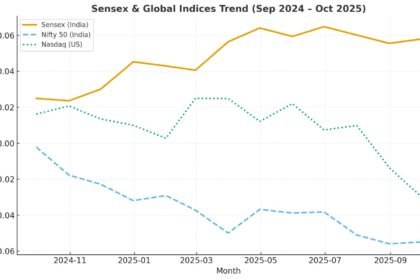Introduction to D2C Food Companies
Direct-to-consumer (D2C) food companies represent a significant shift in the way food products are marketed and sold, particularly in India. The D2C model bypasses traditional intermediaries, allowing companies to sell their products directly to consumers via online platforms. This approach has gained traction in recent years, driven by advancements in technology and changes in consumer behavior. With an increasing number of consumers preferring the convenience of online shopping, the D2C food sector has experienced remarkable growth.
The evolution of D2C food companies in India can be attributed to several factors. Firstly, the rise of e-commerce and digital marketing has made it easier for brands to establish a direct relationship with their customers. This fosters brand loyalty and allows businesses to capture valuable consumer insights, facilitating a more tailored product offering. Furthermore, D2C brands tend to have lower overhead costs compared to traditional retailers, which can lead to competitive pricing and increased profit margins.
Additionally, consumers benefit from the D2C model through enhanced convenience and personalized shopping experiences. By eliminating intermediary barriers, D2C companies can offer a more streamlined purchasing process, delivering products directly to the customer’s doorstep. This direct communication empowers businesses to engage with their audience, enhancing customer service and addressing feedback promptly.
The Growth of the D2C Food Sector in India
The Direct-to-Consumer (D2C) food sector in India has witnessed remarkable growth, largely driven by shifting consumer preferences, advancements in technology, and a growing familiarity with online shopping. With the advent of e-commerce and digital platforms, consumers are increasingly favoring the convenience of ordering food products directly from brand websites or mobile applications. This shift is particularly evident among millennials and Gen Z, who prioritize quality, transparency, and accessibility in their purchasing decisions.
Market trends indicate that the D2C food segment is experiencing a compound annual growth rate (CAGR) of approximately 25% in India, showcasing its potential to transform the traditional food retail landscape. Reports suggest that the D2C food market could surpass USD 10 billion by 2025, driven by an increasing number of brands entering the marketplace and a significant rise in online food purchases. The COVID-19 pandemic further accelerated this growth, as consumers sought safer, more convenient means of accessing food products, leading to a surge in online grocery delivery and home-cooked meal kits.
In terms of consumer behavior, there has been a distinct shift towards health-conscious eating and organic food products. Many D2C brands have capitalized on this trend by offering a range of nutritious and sustainable food options, appealing directly to health-aware customers. Furthermore, enhanced marketing strategies that leverage social media platforms like Instagram and Facebook have allowed D2C brands to engage with consumers more effectively, creating a vibrant community around their offerings.
The digital engagement seen in the D2C food sector is not just a passing trend but signifies a fundamental change in how food products are marketed and sold. Brands are now harnessing technology to analyze consumer preferences and tailor their offerings accordingly, setting the stage for a dynamic and competitive landscape in the Indian food industry.
Innovative Marketing Strategies of D2C Food Companies
In the rapidly evolving landscape of the food industry in India, Direct-to-Consumer (D2C) food brands are leveraging innovative marketing strategies to build strong relationships with their consumers. One of the primary channels these companies utilize is social media, which allows them to engage with audiences in real-time and showcase their products in creative manners.
Influencer collaborations are another significant component of the marketing strategies employed by D2C food brands. By partnering with food influencers and popular social media personalities, companies tap into established audiences and build credibility through authentic endorsements. These influencers often share their unfiltered experiences with the products, which resonates more with their followers than traditional advertising methods. This approach not only boosts brand visibility but fosters a sense of trust and relatability with consumers.
Moreover, content marketing plays a vital role in these companies’ strategies. By creating informative blog posts, engaging videos, and appealing recipes featuring their products, D2C food brands can provide value beyond just the items they sell.
In conclusion, the innovative marketing strategies of D2C food companies in India, demonstrate how effective use of social media, influencer collaborations, and content marketing can foster direct relationships with consumers, ultimately leading to sustained growth and brand loyalty.
Challenges Faced by New D2C Food Brands
The emergence of Direct-to-Consumer (D2C) food brands in India has been noteworthy, with innovative companies aiming to engage directly with consumers. However, the landscape is fraught with challenges that can hinder their growth and sustainability. One of the primary hurdles is intense competition, which has escalated as numerous brands vie for the attention of a diversifying consumer base. Established players, as well as new entrants, are perpetually innovating, making it difficult for newer D2C food brands to carve out their niche.
Another significant challenge is sourcing quality ingredients consistently. New D2C food companies must assure consumers of the freshness and quality of their offerings, which requires efficient supply chain logistics and reliable partnerships with suppliers. The variability in ingredient quality can lead to consumer dissatisfaction and ultimately impact brand loyalty.
Logistics and distribution also pose major challenges for new D2C food brands. Unlike traditional retail, D2C companies must manage order fulfillment, inventory, and last-mile delivery independently. The complexity of logistics increases with geographic expansion, necessitating robust infrastructure to manage warehousing and shipment. New entrants often struggle with these operational aspects, which can affect their ability to meet customer expectations in terms of delivery times and product availability.
Finally, sustaining customer satisfaction is a continual challenge. As many D2C food brands strive to build a loyal customer base, they must invest in customer service and feedback mechanisms. Addressing customer grievances proactively and ensuring positive experiences are crucial in an era where consumer preferences shift rapidly. An example of overcoming these challenges can be gleaned from successful D2C brands that prioritize transparency, quality, and responsiveness.
Consumer Preferences in the D2C Food Market
The emergence of Direct-to-Consumer (D2C) food companies in India has transformed how consumers approach their food purchasing decisions. Understanding consumer preferences in this market reveals critical factors influencing their choices, including health consciousness, sustainability, convenience, and pricing. In recent years, an increasing number of consumers have prioritized health and nutrition, leading them to seek options that align with a healthier lifestyle. This shift has prompted D2C brands, to offer products that not only taste good but also meet health standards, which resonates with health-conscious consumers.
Another influential factor is sustainability. A significant segment of the consumer base is becoming more environmentally aware, showing preference for brands that adhere to sustainable practices. Products that are organic, locally sourced, and packaged in eco-friendly materials tend to attract eco-conscious buyers. Surveys indicate that consumers are more likely to support D2C brands that reflect their values concerning sustainability and ethical sourcing.
Convenience plays a pivotal role in consumer preferences as well. In today’s fast-paced lifestyle, D2C brands are addressing the demand for easy access and quick delivery services. Consumers are inclined to choose brands that offer user-friendly online platforms and swift delivery options, making the purchasing process seamless. The competitive pricing of D2C products is another appealing attribute; direct sales often result in lower prices than traditional retail channels, which attracts price-sensitive consumers.
These preferences highlight the dynamic nature of the D2C food market in India. By recognizing and responding to the priorities of their target audience, D2C food companies can cultivate loyalty and foster long-term relationships with their customers.
Impact of Technology on D2C Food Businesses
Technology plays a crucial role in reshaping the landscape of Direct-to-Consumer (D2C) food businesses in India. The proliferation of e-commerce platforms has enabled companies to streamline their operations and reach consumers directly, eliminating the need for intermediaries. This model not only lowers operational costs but also allows for real-time consumer engagement, thereby enhancing customer satisfaction.
Mobile applications have emerged as another transformative tool for D2C food brands. Through mobile apps, businesses can provide users with an intuitive interface for browsing products, placing orders, and tracking deliveries. The convenience of mobile ordering has significantly elevated the accessibility of food products for consumers, fostering brand loyalty and repeat purchases. Features such as push notifications help keep customers informed about new offerings and special promotions, further driving engagement.
CRM (Customer Relationship Management) software is also pivotal in the everyday operations of D2C food companies. By consolidating customer data, businesses can deliver targeted marketing campaigns that resonate with specific user segments.
Data analytics further enhances operational efficiencies for D2C food companies. By analyzing sales data, companies can identify trends, manage inventory effectively, and refine their supply chain strategies.
In summary, the integration of technology into D2C food businesses is transforming how companies operate and engage with consumers. From mobile applications to data analytics, advancements are enabling brands to streamline processes and create enriching customer experiences.
Future Trends in the D2C Food Industry
The D2C food industry is currently witnessing a transformative phase marked by significant trends that are likely to shape its future landscape. One prominent trend is the increasing focus on health and wellness. Consumers are gradually becoming more aware of the nutritional value of their food, leading to a growing demand for products that promote health benefits. This shift encourages brands to develop offerings that not only satisfy cravings but also contribute to a healthier lifestyle. Snack options fortified with vitamins, low-sugar alternatives, and consciously sourced ingredients are anticipated to become mainstays in the D2C sector.
Complementing the health trend is the rising popularity of plant-based diets. As more individuals turn towards vegetarian and vegan lifestyles, food companies are adapting their product lines to include innovative plant-based options. This change is not merely a response to consumer demand but a reflection of a broader societal shift towards sustainability and ethical sourcing.
Sustainable sourcing practices are also pivotal as consumers increasingly prioritize brands that demonstrate environmental consciousness. Transparency in sourcing, minimal packaging, and eco-friendly practices can significantly enhance brand loyalty among contemporary consumers. Furthermore, enhanced consumer engagement is on the rise; brands are now exploring personalized marketing strategies and direct communication channels to foster strong relationships with their customers.
Overall, as the D2C food industry continues to evolve, adaptability will remain crucial.
Conclusion and Key Takeaways
The rise of direct-to-consumer (D2C) food companies in India represents a significant transformation within the nation’s evolving food landscape. Brands exemplify the innovative approach these companies adopt to cater directly to consumers’ needs. Through unique product offerings and a strong emphasis on quality and convenience, these brands have carved out a niche that addresses changing consumer preferences, particularly in urban areas where fast-paced lifestyles demand quick yet healthy food options.
The shift towards D2C models not only enhances accessibility to a diverse range of food products but also empowers consumers with more informed choices. Companies adopting this model often engage directly with their customers, allowing for greater transparency in sourcing and production processes. This interaction cultivates a sense of trust and community that traditional retail often overlooks. As such, D2C food brands have the potential to become a cornerstone of India’s food ecosystem, aligning with contemporary consumer values that prioritize sustainability, health, and local craftsmanship.
Furthermore, the immense growth potential for new entrants in the D2C food market remains promising. With increasing internet penetration and rising customer awareness regarding food quality, aspiring D2C brands have the opportunity to thrive. These companies can leverage digital platforms to reach their target audience more efficiently and economically. As they continue to innovate and adapt to consumer trends, D2C food brands are likely to play an integral role in shaping the future of the food industry in India.
In light of these insights, we encourage readers to explore and support these emerging D2C food companies. By doing so, consumers not only benefit from unique and high-quality products but also contribute to the broader movement towards a more sustainable and consumer-driven food market.
Disclaimer: This article information are based on independent research and are intended for informational purposes only.

















